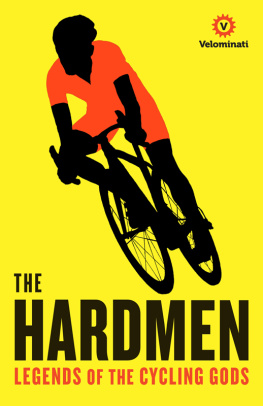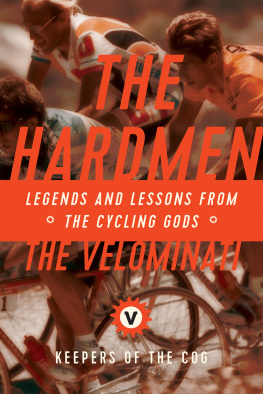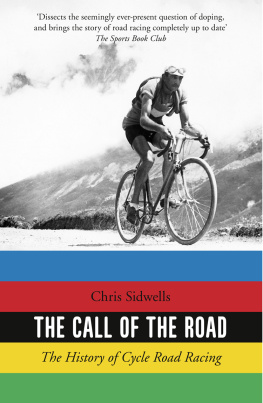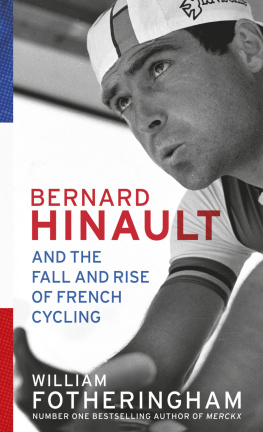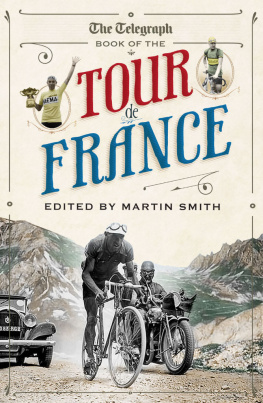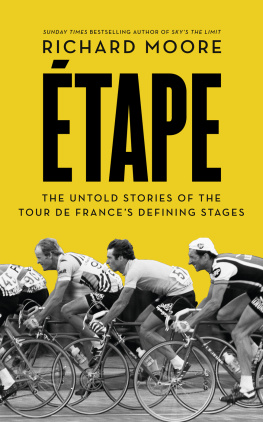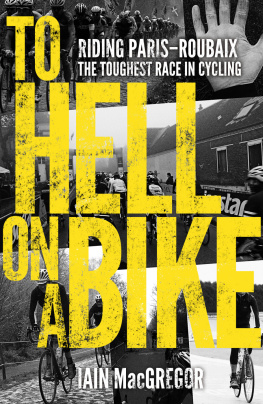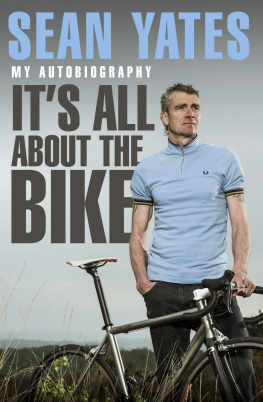THE
HARDMEN
THE VELOMINATI are founders of a singular online community www.velominati.com which celebrates the history of road cycling with a distinctive point of view, best described as (ir)reverence. Their infamous Rules challenge cycling fans to emulate their heroes in everything from training (it never gets easier, you just go faster) and equipment (the correct number of bikes to own is n+1) to sock length and coffee choice. The Rules were published in book form in 2013. Frank Strack, Editor in Chief, spreads the word at bike shows worldwide, and in his column for Cycling magazine.
ALSO BY THE VELOMINATI
The Rules
THE
HARDMEN
LEGENDS OF THE CYCLING GODS

First published in Great Britain in 2017 by
PURSUIT BOOKS, an imprint of
Profile Books Ltd
3 Holford Yard
Bevin Way
London
WC1X 9HD
www.profilebooks.com
Copyright Frank Strack, 2017
The moral right of the author has been asserted.
All rights reserved. Without limiting the rights under copyright reserved above, no part of this publication may be reproduced, stored or introduced into a retrieval system, or transmitted, in any form or by any means (electronic, mechanical, photocopying, recording or otherwise), without the prior written permission of both the copyright owner and the publisher of this book.
A CIP catalogue record for this book is available from the British Library.
eISBN 978 1 78283 236 2
FOREWORD
Its weird, you were so soft when you started, I remember thinking that. I thought you gave up too easy. Yet for some reason youve become harder than almost all of us, thats not normally what happens.
Christian Vande Velde to me, sometime in 2011
He was right of course, I didnt come into cycling to repeatedly bang my head against the proverbial wall, I came to win bike races in the same way my heroes Miguel Indurain and Maurizio Fondriest did. I didnt plan on all the hurting that would come with the 1,100 times I didnt win, not even mentioning the stuff that damaged me off the bike. I might have rethought it all if I had. Probably not, though. I still love it, you see, even with all the damage. And in truth I was like a moth to a flame when I discovered professional road racing; my fate was sealed there and then. It seemed so completely and utterly bonkers. I had no idea just how bonkers until I joined their ranks.
The rules were everywhere. The whole sport was dictated by them, they existed in the ethereal; well, they had to be since nobody ever bloody wrote them down. Each one of us had to learn them through the school of hard knocks; if you didnt learn, you didnt last. Yet, if you did, you graduated beyond the neo-pro stigma and became un homme du mtier which might translate into English as skilled in the art.
I was a pretty good artist. That was even how the French would refer to me; LArtiste (well, Cyrille Guimard would, though not in a positive way more like a gentle put-down). To be fair, it was better than being Le Dandy, which they also called me. That was probably the time in my life Christian VdV was referring to when he said I was soft. He was right; a grain of sand could stop my machine (I actually read a directeur sportif say that about me in LEquipe, which, by the way, didnt help our relationship).
The point of this is that I ended up cracking because of that softness, and making mistakes; doping, cheating, lying. All because of softness and a wrong love. I didnt stand up for my own values; I went too deep into a dark part of the mtier, one that had always existed and was never really talked about; the one of doping. I went deep. I lost everything. Then I came back and fell in love with the sport all over again. I didnt care about their rules anymore, I only adhered to mine. In the process I became a harder and much better bike racer and, dare I say, person.
Thats the point of this book; its about the bike racers who made up their own rules. Because, as much as each of us must learn the rules from others at the beginning, it is only when we make them our own that we become hard.
David Millar
PROLOGUE
The trick, William Potter, is not minding that it hurts.
T. E. Lawrence, in Lawrence of Arabia
It is said that after his non-stop run from Marathon to Athens, Pheidippides immediately collapsed and died. Perhaps the most comprehensive example of athletic suffering imaginable; it also demonstrates the only sensible thing to do after running such a distance. This is the only mention we will make of running in this text. We are Cyclists, not savages.
The Velominati are dedicated to maintaining the cannon of Cyclings culture and etiquette in the form of The Rules. Cycling is a sport with a rich and colourful history; its traditions and codes of conduct have evolved over more than a century. The Rules (listed in full on p. 207) cover all aspects of this, ranging from states of mind (Rule #9 // If you are out training in bad weather, it means you are a badass. Period) to traditions (Rule #13 // If you draw race number 13, turn it upside down). And from aesthetics (Rule #14 // Shorts should be black, and Rule #33 // Shave your guns) to etiquette (Rule #43 // Dont be a jackass, but if you absolutely must be a jackass, be a funny jackass).
Chief among them is Rule #5:
Rule #5 // Harden the Fuck Up.
Rule #5, also known as The Five, or The V, is the essence of what it means to be a Cyclist: to persist in the face of intense suffering. It is a state of mind, bordering on a lifestyle. It means you are tough and disciplined, never following the path of least resistance. It doesnt mean you cant also fuss about with aesthetics or complain about the weather. But after youve finished faffing about with aesthetics and ancillary details you still submit to the deluge and go out and do your training.
Strength and pain are both transient things; they wax and wane not just with the rhythm of our training but with the cycle of our morale. Certainly the hours we pour into our sport play a crucial role in our fitness, but our minds play perhaps the biggest part. The mind is what dissociates pain and effort from the task at hand; it is the mind that silences the pleas coming from the body to yield. This is the essence of The Five.
Nearly every religion pays close heed to the concept and the value of suffering. The Buddhist approach is particularly helpful in its emphasis on experiencing things without clinging to them. Everything changes; embrace change and the fluidity of life. There is a beautiful freedom when you dissociate from the suffering; there is liberty in the realisation that how you endure suffering is a choice. This element of choice, what psychologists refer to as the Locus of Control, is part of what allows Cyclists to feel pleasure through suffering. (Either that or its a personality disorder.) If we are to believe the white-bearded master computer program in The Matrix, having a choice even an illusory one unlocks our sense of control and opens up an avenue of personal discovery by which we might learn something fundamental about ourselves or achieve some kind of salvation. Like Michelangelo wielding his hammer to chip away fragments of stone that obscure a great sculpture, we turn our pedals to chip away at our form, eventually revealing our true selves as a manifestation of hard work, determination and dedication.
As Cyclists, we choose to suffer; suffering liberates us from our daily lives. It presents itself in many forms: the pain of a climb, the cold of a rainy winter training ride, the unbridled fury at a clicking bottom bracket or insubordinate drivetrain. Life is a complicated mess of interdependencies in which we are more likely to be passengers than drivers; politicians, corporations, friends, family, morals, laws and physics routinely get in the way of us achieving our dreams. To ride our bikes and suffer by our own choice is to take control, if only for a short while, and escape into a more simple world.
Next page
